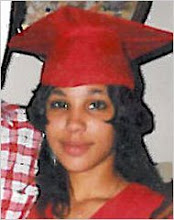LIMA, Ohio (AP) -- The death of Tarika Wilson during a drug raid has left tensions here simmering between minorities and police.
Bishop Richard Cox speaks about the case at a special Lima city council meeting on January 7.
Wilson, 26, was fatally shot and her 1-year-old son was wounded when SWAT officers burst into her home looking for her boyfriend.
Black clergy leaders are nervously waiting for investigators to decide whether to charge the veteran officer who fired the fatal shots. The officer is white, the victims black.
"This was ready to blow," said Daniel Hughes, one of several pastors who has been preaching patience while residents demand more answers about the shooting. "It still could go either way."
More than two weeks have passed since the January 4 death of Wilson, a 26-year-old mother of six. Her baby son, Sincere Wilson, was wounded and had a finger amputated.
Little is known about what happened. Family members say Wilson was an innocent bystander. Police have said her 31-year-old boyfriend, who was arrested during the raid, was selling drugs out of the house. The raid concluded a long-term investigation into the sale of illegal drugs from the home, the police chief said.
The shooting has led to much soul searching about the mistrust between minorities and police and what happens to cities when manufacturing jobs move out and drugs move in.
Don't Miss
WLIO: Residents speak out about Wilson's death
Philadelphia police shootings scrutinized
"The root of this is we have no jobs here," said Artria Knuckles, who manages a Taco Bell and supports four children in this northwestern Ohio city. "They have to do what they can to survive. They have to resort to selling drugs."
It's either that or join the military, she said: "There's no way out."
The shooting took place in a neighborhood pressed up against a rail yard and downwind from a sprawling oil refinery and chemical plant.
The area south of the city's downtown is where blacks settled after migrating to take jobs in bustling factories generations ago. For decades, Lima residents built car engines for Ford Motor Co., tanks for the Army and locomotives for the railroads.
Some of the factories are still open but far fewer people work in them now.
"The reality is there aren't a lot of opportunities for young people," said Hughes, whose The Future Church has been in the neighborhood since 1973.
Since the shooting, he and other church leaders have heard stories from residents, mostly black, about trouble with police. About one out of four people in the city of 40,000 is black.
Dozens lined up to complain about mistreatment and question investigators looking into the shooting at a forum last week led by Ohio's attorney general.
Some complained that the officer who shot Wilson remained on paid leave. Others said the investigation would be handled differently if the shooter wasn't a police officer or if the victim was white. The investigation has been turned over to the state attorney general's office because a city police officer was involved.
"Perception, rumor and suspicion are dividing this community," Attorney General Marc Dann said. "You have my word we will do everything in our power to see the truth is discovered and justice is served."
He also pledged to rebuild trust between police and the black community.
"Maybe this is the place we can change how the community and police work together," Dann said. "We can't keep doing things the same way and expect different results."
Still, not many people left the meeting satisfied.
"People really want answers. They want them now," said Alfred Dukes Jr., retired from the Ford engine plant. "Everybody should be outraged, black and white. I really think the city should be thankful nothing exploded."
In the 1990s, Lima became involved in a national program known as Study Circles, in which diverse groups of citizens got together to discuss race, crime and youth. The communitywide effort, led by clergy members, originated after a local Korean store was firebombed in Lima the night of the 1992 Rodney King verdict in Los Angeles.
City councilman Ray Magnus credited clergy members with keeping peace in the city.
"The pastors are a good influence in this city," he said. "You don't know what might happen if you had more aggressive people take charge."
Subscribe to:
Post Comments (Atom)

1 comment:
I would have to say the issue is a lot more complecated than people make it out to be.
An overzealous police officer jumped the gun, was what happened.
It is actually a little rare here Lima OH where I live for there to be problems with the city police. Most of the problems are actually with the Allen County Sheriff's department (just Google "Allen County Sheriff Beck" and you'll find all sorts of incidents.)
However, there are a few bad eggs in our City police as well, and underfunding doesn't help.
Where the particular case in question really goes bad wasn't covered by CNN very well. They specifically tried the officer for a high level murder charge when there wasn't enough evidence to prove he didn't get the false impression that the person had a gun.
Well I doubt he obeyed procedure, and he probably presumed everyone in the place had a gun, and thus when he saw the woman delaying in following his orders he saw it as resistance and fired, this is clearly not first degree murder, but second degree murder at best, so they intentionally charged him with too high a crime so that he would get off on the double jeopardy technicality.
Post a Comment